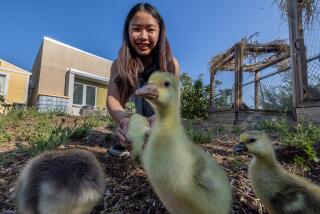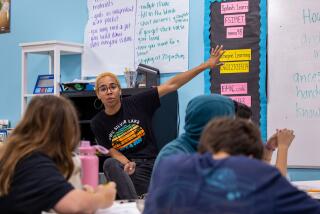LA HABRA : Inexact Science of Fun Aids Teachers
- Share via
Imperial Middle School was filled with wide-eyed students this week as they learned the magic of science. But these pupils weren’t children. They were teachers who attended a science fair designed to improve science teaching in the La Habra City School District.
In the hopes of making the fair fun as well as informative, seven instructors wore assorted clown suits and decorated the school to look like a circus. Several workshops were offered so that the 200 or so teachers attending the fair could conduct the experiments in small groups.
Imperial science teacher Robert Sykes was dressed in clown attire as he taught a seminar on rockets.
With applause and enthusiastic outbursts from his peers, Sykes used a bicycle pump to inject air into a metal pipe that had a plastic bottle, half filled with water, attached to it. After several seconds of strenuous pumping, the bottle shot 50 feet into the air.
“The water in the bottle bubbles up and the pumping forces it to fly,” explained Granville Yoshina, who also teaches science at Imperial.
Yoshina, Sykes and five other science teachers decided to hold the fair after attending a similar event at UC Irvine last year. They wanted to show their colleagues how to captivate students’ interest in science by using hands-on demonstrations while teaching the sometimes dreaded subject.
“Science is not really a paper-and-pencil discipline,” said Annette Clark, a sixth-grade teacher at Imperial who also attended the UCI conference. “It’s like art. You don’t just study it in a book. You’ve got to do it.”
Clark said she used to feel intimidated by science and didn’t even attempt to try experiments in her classroom.
“I was afraid,” she conceded. “And there are a lot of other teachers who shy away from it. But once you do a few experiments, you become brave and equate science with fun. My favorite subject to teach now is science.”
Clark said that at the UCI conference she learned how to use common objects to demonstrate scientific principles. The seven began applying their new techniques in the classrooms this school year and wanted to spread the knowledge.
“We did the fair to encourage teachers to do more with science--to show them that it’s really not that intimidating,” Clark said.
“The kids like the hands-on,” said David Shouse, Washington Middle School assistant principal, who grinned and marveled as he participated in a liquid-density experiment. “I think it’s a neat thing that our students are going to thoroughly enjoy.”
For sixth-grade teacher Penni Pettengill, the one-hour science fair--complete with popcorn, wizards and cotton candy--wasn’t enough. “We need a whole day, but I don’t think science is a scary thing any more,” she said.
Said Clark: “If I told you about another country and didn’t show you a picture of it or take you there, it would be boring, and you really would have no motivation to learn more about it. Once you experience something and you do it, it leads you to wonder and question. That’s a motivator, and that’s what science is all about.”
More to Read
Sign up for Essential California
The most important California stories and recommendations in your inbox every morning.
You may occasionally receive promotional content from the Los Angeles Times.













